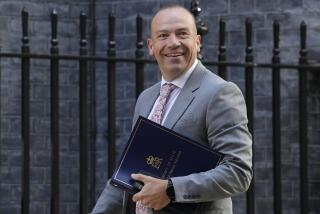Britain Ends Belfast Patrols; Disarmament of Militias Sought
LONDON â The British army will end its routine patrols in Belfast, leaving republican areas without military cover for the first time in more than two decades, the government here said Friday.
This move by British authorities was another step in the peace process that has been advancing steadily since a cease-fire was declared by the Irish Republican Army almost eight months ago.
The announcement coincided with an appeal by Irish Prime Minister John Bruton for paramilitary groups in Northern Ireland, republican and unionist, to give up their weapons.
At a Dublin meeting, Bruton declared: âI will speak directly to those in the paramilitary organizations who still have stocks of guns, which, by their own declaration, they donât have any use for--because if they are committed to peace, these guns are no longer necessary.â
At the same time in Belfast, some unionists protested todayâs planned visit to Northern Ireland by Irish President Mary Robinson on what was described as a private visit approved by the British and Irish governments.
Unionist Member of Parliament David Trimble said the visit to Newry, Craigavon, and Londonderry will âcause offense.â
In Belfast, Sinn Fein, the political arm of the IRA, insisted that direct talks with British ministers over the future of Northern Ireland must include the pullout of British troops in a âdemilitarizationâ of the troubled province.
Sinn Fein seemed determined to link âdemilitarizationâ of British troops with âdecommissioningâ of IRA arms, demanded by the London government as the price of admitting the group into full-fledged peace talks.
Though this appeared to be a temporary stumbling block, British officials did not rule out a meeting between Sinn Fein representatives and the Northern Ireland minister, Michael Ancram, next week.
Ancram has met representatives of unionist paramilitary organizations, who, the British said, have given assurances they will eventually decommission their weapons in Northern Ireland.
Sinn Fein official Mitchel McLaughlin said he believes that the two sides were âwithin touching distanceâ on the issue of joining talks. But the British indicated that the republicans have not yet given enough assurances on arms.
In Belfast, British army patrols have already ceased in mainly unionist East Belfast and in the central shopping area.
*
The armyâs Friday decision means that mainly Catholic West Belfast will be policed only by the Royal Ulster Constabulary.
A statement by the constabulary on Friday said: âFrom today, military cover will no longer be required on a regular routine basis in the remainder of the city. Army support for the RUC will however continue to be available as and when necessary.â
The latest security move follows the withdrawal of 400 British troops from County Armagh and County Tyrone and word that another battalion will be leaving shortly, if the cease-fire continues to hold.
There will be some military movement, but on a limited scale, officials said.
However, there are no immediate plans to close any of the big military bases in Belfast, which still house more than 15,000 British armed forces.
More to Read
Sign up for Essential California
The most important California stories and recommendations in your inbox every morning.
You may occasionally receive promotional content from the Los Angeles Times.










